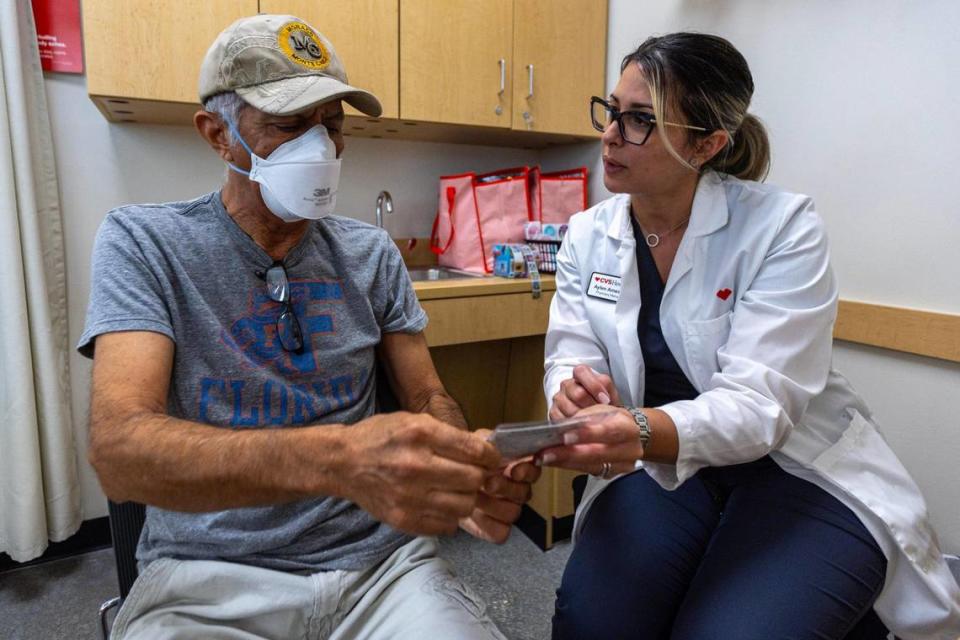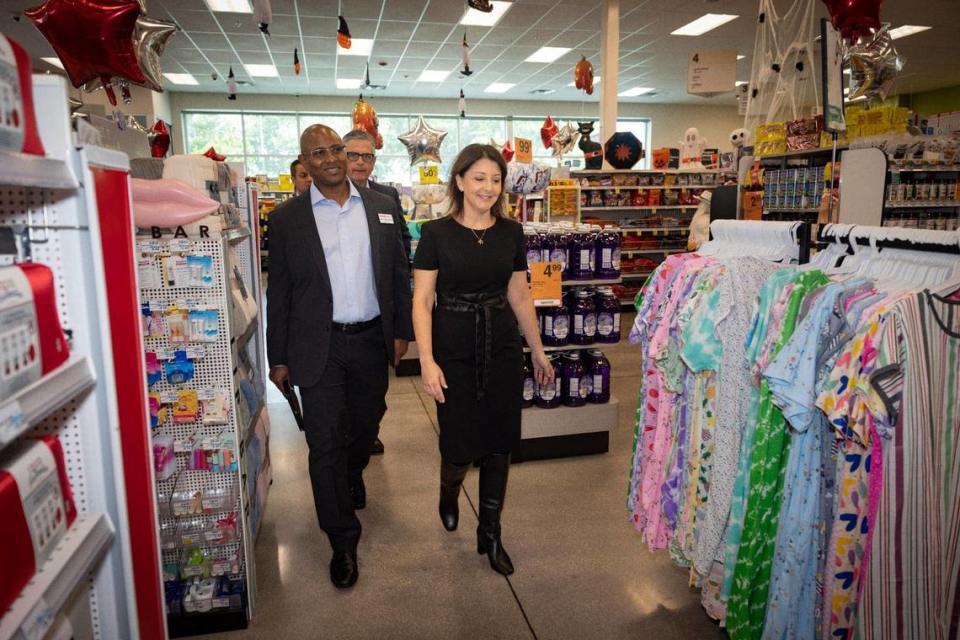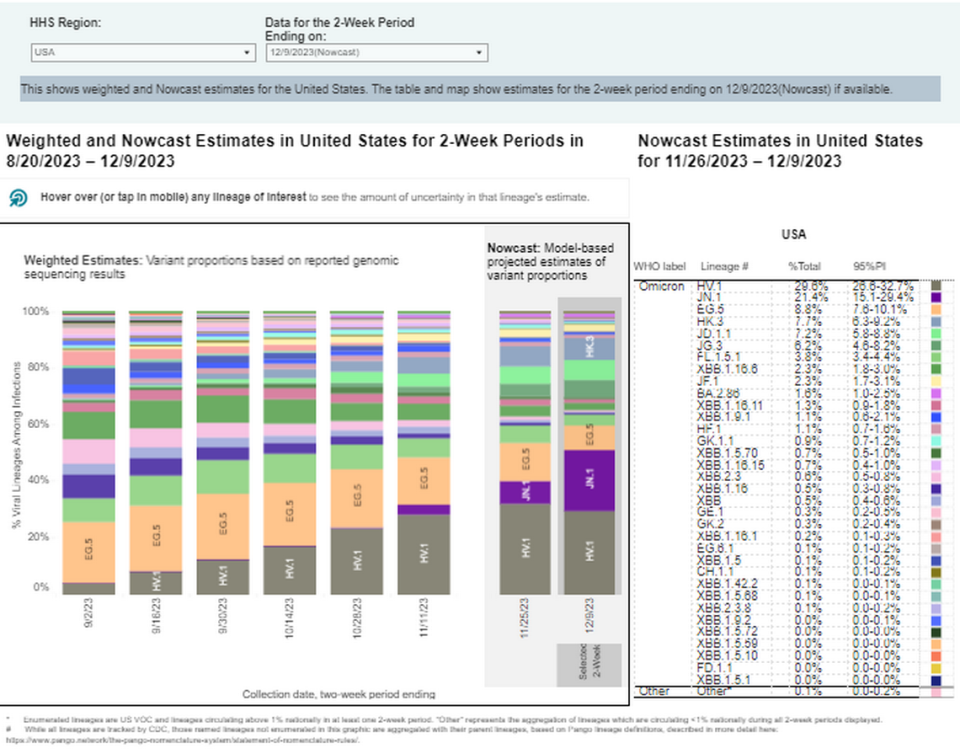Fewer in Florida are getting new COVID shot. Why they’re refusing — and what it means
Fewer people in Florida are getting COVID shots this year despite updated vaccines, aggressive ads and reminders from drugstores and drug companies. At the same time, public health authorities are closely watching the spread of a more contagious COVID variant spreading across the country.
The low vaccination rates for COVID in Florida could have a fallout at a time of travel and gathering for the holidays. Already, hospitalizations for respiratory illnesses are on the rise.
But even as pharmacies and pharmaceutical firms hard-press the new COVID shots with frequent TV ads and frantic phone texts, there’s vaccine weariness and wariness in Florida. Many people are worried about possible side effects or aren’t worried about a COVID threat.
And they’re not getting the shot.
“In 2019 and 2020 people were dying and everyone was scared — you didn’t have a choice,” said Miami-area yoga teacher Natasha Salmon, who got the initial vaccine along with boosters, but decided not to get a new shot.
The vaccine rate in Florida is low — 5% of the population has taken the COVID shot since the September rollout, according to Miami Herald calculations of vaccine data from the Florida Department of Health. The CDC estimates about 11% of adults and about 7% of kids in Florida are vaccinated with the new shot.
Since the first doses of Pfizer and Moderna vaccines were administered, demand for shots has gone down. Fewer and fewer Florida residents turned out to receive each new booster as they rolled out, according to Herald calculations of CDC data.
By the third month of the original doses launch, for example, about 33% of eligible Floridians were immunized. But only about 9% got a Bivalent shot, the booster formulated last year to fight the Omicron variant, during the first three months of its release. About 70% of adults in Florida have completed the primary COVID vaccine series, as of May 2023, CDC data shows.
“People have just gotten so used to living with COVID that many people are not taking advantage of the vaccine. We have the same problem with the flu vaccine; it’s also underutilized,” said Mary Jo Trepka, an epidemiologist at Florida International University. “It’s particularly concerning when it’s underutilized by the older individuals because they’re most at risk of getting severe illness and being hospitalized.”
Why are people aren’t getting the new COVID shot
There’s not one factor for people who pass on a new COVID vaccine — although Salmon has her own family medical concerns about the shot.
Some don’t consider COVID as dangerous anymore. Others worry about health effects. COVID vaccine travel requirements are over. And some people never got vaccinated from the start, and they aren’t going to now.
Also, COVID vaccines are no longer free, although most insurance covers the cost. People without insurance can still get free shots through federally funded programs.
More people are getting flu shots than COVID vaccinations despite similar risk factors for severe disease, particularly among seniors, said Dr. Andrew Pekosz, professor and vice chair in the department of Molecular Microbiology and Immunology at the Johns Hopkins Bloomberg School of Public Health.
“For some reason, we’re having this aversion to taking the COVID vaccine. ... Even people who take respiratory vaccines, like influenza, don’t seem to be taking the COVID vaccine, and it’s a little bit unclear why that is right now, Pekosz said. “But it’s certainly a trend across the country.”
Pekosz speculates that “vaccine fatigue,” confusion about the shots, and misinformation have likely led to fewer vaccinations.
“When people hear mixed messages like that, their most common response is to not do anything until they wait and sort of work out what’s correct and what’s not,” he said.
CVS, which owns traditional CVS stores, CVS y mas, and Navarro Discount Pharmacies, told the Miami Herald that the company has vaccinated about 500,000 patients in Florida with the new COVID shot, 200,000 of those in Miami-Dade and Broward counties.
“Demand has been historically greater with the 65 and up age group and we are seeing that same trend with the updated COVID booster,” CVS Miami-based district leader Victoria Mottola told the Miami Herald in an emailed statement.

However, there is still resistance among seniors.
Dr. Michael Gloth, president of the Florida Geriatrics Society, has noticed a decrease in interest among seniors, a high-risk group, for the new COVID shots compared to previous boosters.
Many of his senior patients have had COVID before and have also been vaccinated. The Naples doctor frequently discusses the COVID, flu and RSV vaccines with his patients.
“There’s a group that has decided that they’re going to stay up to date with the boosters and there’s a group that decided that they’re not going to get the boosters,” he said.
In Natasha Salmon’s case, her daughter had a stroke and was hospitalized just days after getting her COVID vaccine at age 42 in 2021. The 78-year-old Salmon said the family doesn’t know if there’s a connection between the vaccine and her daughter’s stroke, which left her disabled, but it has them wary of getting vaccinated again.
Now that there are fewer COVID deaths and hospitalizations, the grandmother said she’d rather focus on exercising and eating healthy and risk getting the illness, instead of vaccination.
“It’s like winning the lottery,” Salmon said, who is still taking precautions like wearing a mask, washing her hands and using hand sanitizer to reduce the risk of bringing viruses home to her daughter. The U.S. has recorded more than a million COVID infections and deaths this year.
In May, the World Health Organization declared the global COVID-19 emergency over. The U.S. ended its federal public health emergency. COVID has shifted from pandemic to endemic, which means that while the virus is still around, it’s not overwhelming hospitals with sick patients.
For many, life is back to normal. Some might still wear masks occasionally. But for health officials, all eyes still remain on COVID, along with other respiratory illnesses, such as flu and RSV.
Mandy Cohen, the director of the U.S. Centers for Disease Control and Prevention, set off on a national tour earlier this year, with a stop at a Westchester pharmacy, to promote vaccinations ahead of the colder, winter months, in an effort to prevent another “tripledemic” of COVID, flu and RSV in the country.
Pfizer and Moderna have also been promoting the vaccines, blasting ads on TV to try and encourage vaccination.
“As the world keeps changing, so is COVID-19,” says the narrator of a polished Pfizer TV ad showing people dancing and playing sports, then sticking an arm out to show a bandage that covers the place that took a shot.
“Stay protected! Schedule your COVID-19 vaccine now,” pings a text from Walmart to a customer who got the first shot and boosters, but not the next round of new shots that rolled out this year. And another text soon followed: “You may already have been vaccinated for the flu, but don’t forget an updated 2023-2024 COVID-19 vaccine.”
The pharmaceutical companies were banking on COVID demand to help with sales now that they could sell the vaccines in the private market — with the shots ranging in price from $120-130 per dose. But demand for COVID vaccines and treatment has plunged, spelling bad news for the companies.
Moderna suffered a steep financial slide in November — a loss of $3.6 billion for the quarter. Pfizer is planning to embark on a $3.5 billion cost-cutting effort, including layoffs.

Fallout from low vaccination rates?
The U.S. Centers for Disease Control and Prevention on Dec. 14 issued a national health advisory alerting healthcare providers of increases in “respiratory disease activity caused by multiple pathogens,” including COVID, influenza and RSV, as well as an increase in cases of multisystem inflammatory syndrome in children, or MIS-C, after COVID infection.
The highest respiratory disease activity in the U.S. is running across southern states, according to the advisory. The federal agency is urging doctors to administer COVID, flu and RSV vaccines and to recommend antiviral medications for influenza and COVID-19, especially for those considered to be high risk for severe disease.
Providers: Urgent need to increase vaccination against flu, COVID-19, RSV.
- Administer immunizations now to patients, if recommended.
- Recommend antiviral meds for flu and COVID-19 for all eligible patients, esp. high-risk patients
Read full alert: https://t.co/EqS72FQvse pic.twitter.com/WkvXlKTbI2— CDC (@CDCgov) December 14, 2023
Jim O’Donnell got the new COVID vaccine at the same time he got a flu shot. O’Donnell, who had previously been vaccinated with the primary series as well as boosters, got sick with COVID for the first time last year. It felt like a “bad flu,” he said. The 68-year-old and his wife were vaccinated at a CVS shortly after the new shots were rolled out in September because “everybody started getting sick again” and they wanted to reduce their chances of falling ill.
The newly updated COVID vaccine was approved by federal regulators in September when COVID cases and hospitalizations were rising nationwide. Florida had some of the highest COVID hospitalizations in the country at the time, though it was still significantly lower than in previous waves.
O’Donnell said he and his wife are more focused on their health because they’re getting older. And while social distancing is a thing of the past, they’re more cautious after the COVID pandemic. O’Donnell said they try to avoid large gatherings, and when they go to an event, they always have a “mask at the ready.”
Tania Sotelo, a Miami mother of three, also decided to get her family vaccinated against COVID.
Sotelo said they had vaccination appointments at Walgreens the first weekend the new COVID shot became available. Even though Sotelo finds COVID a “very low concern” now compared to earlier in the pandemic, she wants to make sure her family stays healthy. Plus, “we believe in vaccines,” she said.
COVID vaccine side effects?
Doctors say people who get the new COVID shots may feel some side effects, but not much different than the symptoms they got the first time around, including arm soreness and flu-like symptoms. Rare adverse effects could include allergic reactions and other complications.
While COVID-19 vaccines have been linked to cases of myocarditis and pericadrditis, types of heart inflammation, federal health officials say these incidents are rare and that the benefits of vaccination outweigh the risks.
But Florida Surgeon General Joseph Ladapo remains at odds with federal health officials on the safety and effectiveness. Earlier this month, Ladapo sent a letter to the U.S. Food and Drug Administration questioning whether the agency had investigated safety concerns regarding residual DNA contaminants from Pfizer and Moderna’s COVID shots.
On Dec. 14, Peter Marks, director of the U.S. Food and Drug Administration’s Center for Biologics Evaluation and Research, sent a letter to Ladapo, stating that no SV40 proteins, a DNA virus, “are encoded for or are present in the vaccines” and that studies in animals have found “no evidence for genotoxicity from the vaccine.” The FDA wants “to make clear that based on a thorough assessment of the entire manufacturing process, FDA is confident in the quality, safety and effectiveness of the COVID-19 vaccines,” wrote Marks.
A recent federal study suggested that Pfizer and Moderna’s COVID-19 vaccines could be linked to a slight increase in stroke risk when administered with a high-dose flu vaccine, usually given to older people. But the research is far from conclusive, according to the New York Times. At least five other recent studies didn’t find additional stroke risk after “vaccination for COVID-19, influenza, or both,” CNN reported.
Does the COVID shot work against variants?
The new COVID vaccines released in September were formulated to target Omicron variant XBB.1.5, which was the dominant strain in the U.S. earlier this year, in preparation for the 2023-2024 fall and winter season.
Federal health officials say the updated shot will provide protection against the circulating variants in the country. Those includes omicron descendant HV.1, the current dominant strain in the country, and JN.1, which is rapidly spreading in the U.S. and is estimated to make up about 21% of cases, CDC data shows.

The FDA approved the new shots for people 12 and older and granted emergency use authorization for kids as young as 6 months. The agency expects the new vaccines will be updated annually like flu shots.
CDC Director Dr. Mandy Cohen recommended the shots for everyone 6 months and older to better protect against circulating variants in the country, following the advice of an independent advisory committee. How many shots you need will depend on your age and the timing of your previous dosages.
READ MORE: Emerging COVID variant is spreading ahead of the holidays. Are you still protected?
Ladapo, the Florida surgeon general who has clashed with federal health officials on masks, vaccines and the state’s COVID-19 policies, recommends that people under 65 not get the new vaccines and that those 65 and older speak with their doctors.
The FDA, CDC and scores of public health experts say the vaccines are safe, having undergone rigorous testing and monitoring throughout the pandemic — and the benefits far outweigh their risks.
What’s the COVID situation like in Florida?
▪ COVID is “relatively stable in Florida,” said Trepka, the FIU epidemiologist. The first week of December, for example, saw about 800 new COVID-related hospitalizations in the state compared to about 1,700 hospitalizations last year, she said.
▪ So far, there have been more than 564,200 confirmed cases of COVID-19 in Florida this year and more than 8,000 deaths, according to state data. Keep in mind it’s more difficult now to gauge the disease spread because COVID test sites are mostly gone and at-home test results don’t get reported.
▪ About 3% of people in Miami-Dade and about 4% of people in Broward have received the new COVID vaccine, according to Miami Herald calculations of state data. About 5% of people in Monroe County and about 5% of people in Palm Beach County have gotten the new shots.
Miami Herald staff writer Devoun Cetoute contributed to this report.

